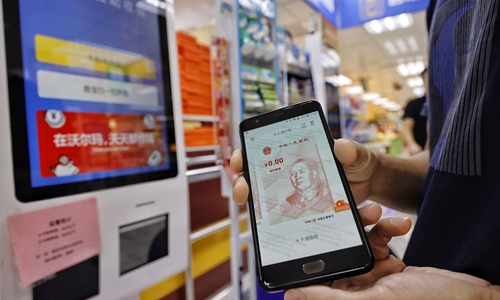
Residents who received "red packets" of digital RMB use the money in stores in Shenzhen, Guangdong Province, on Wednesday. The city launched a pilot program to distribute 10m yuan ($1.49m) in the form of digital currency to residents on Monday.Photo:Li Hao/GT
On Wednesday afternoon, after several days of ups and downs, bitcoin crossed $51,000 and reached a new record high. At the same time, a new round of digital currency trials have concluded in China, offering more opportunities for investors.
Chen Bo, director of the Digital Finance Research Center at the Central University of Finance and Economics, told the Global Times on Wednesday that the new bitcoin enthusiasm drew more attention to China's digital currency and the general air among investors is positive.
"More new investors chose to purchase bitcoin as it rose," said Chen, adding that the high risk and high potential returns are attracting many Chinese investors.
With a ban on bitcoin trading in China imposed by the counry's central bank in 2017, China is shaping the future of its own sovereign digital currency.
The third round of large-scale digital yuan trials was launched in Beijing on February 10, running to the end of the Lunar New Year holidays. A lottery for city residents was used to distribute 10 million yuan ($1.55 million) of digital currency in the form of 50,000 digital "red packets", each containing 200 yuan.
The digital red packets can be used during specified periods at designated physical stores. Analysts said the trial will pave the way for the digital yuan's broader use and globalization.
Prior to the trial in Beijing, two rounds of digital yuan trials were launched in Shenzhen in South China's Guangdong Province and Suzhou in East China's Jiangsu Province, with 100 million yuan of digital "red packets" distributed.
"The digital 'red packet' is aimed at bolstering local consumption and encouraging migrant workers to enjoy their holiday while 'remaining in place'," said Chen.
Chen suggested that the digital yuan trial was backed by strong financial support by the government and formed a key part of the country's future development in the digital currency sector.


